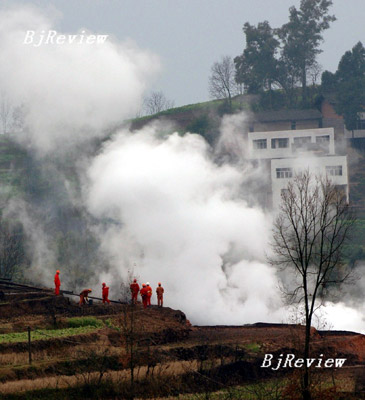|

A Bullish 2006
China's stock market soared to an all-time high on the last trading day of 2006, as a flood of fresh investment funds boosted the benchmark index 4.2 percent and brought its total gain for the year to 127 percent.
Experts said a number of factors contributed to the bullish year, which marked the end of a four-year slump and launched China into the ranks of the best-performing capital markets in the world. Factors cited include China's continued economic growth, the success of recent market reforms, and massive fund inflows from listings by some of China's flagship firms.
The huge amount of new funds raised for investment in recent months, much of which has not yet entered the market, means the bull run is unlikely to end soon, analysts said.
The news that the Chinese Government is expected to pass a new corporate tax law in 2007 is among the favorable factors that triggered strong market sentiment in December, a month that saw a 27 percent increase.
Extending the Upsurge
China's stock market will continue its bullish performance in 2007 to achieve a 20 percent growth in its total value, according to a report published by the State Information Center on December 28.
The report draws the conclusion from the anticipation that China's listed companies will record a 20 percent growth in business.
Meanwhile, the stock market will see a fierce restructuring, with major blue chips continuing to rise, but other issues tumbling by a big margin, according to the report.
The total market value of China's stock market hit a record 8 trillion yuan on December 20, making it the largest emerging stock market in the world.
With a booming stock market and rising renminbi value, more capital will pour in to drive up Chinese shares, says the report.
More Convertible Renminbi
The People's Bank of China, the central bank, issued new individual foreign currency regulations on December 29 in a bid to relax restrictions on foreign exchange transactions.
The regulations, which will come into effect on February 1, impose an annual quota on foreign exchange settlements of individuals, abolishing the previous limit for every settlement transaction.
For transactions within the annual quota, individuals can handle foreign exchange settlements directly in a bank. Beyond the quota, settlement transactions under current account must go through the inspection of a bank and those under capital account are subject to review by the foreign exchange authorities.
The annual quota will simplify the procedures for individual foreign exchange settlements, said a central bank spokesman, adding that China put an annual quota on foreign exchange purchases by individuals last May, resulting in an increase of 210 percent in purchases in May to November over the same period of the previous year.
New Interbank Lending System
China's central bank is about to formally unveil a new set of market-oriented interest rates for interbank lending. According to a statement posted on the official website of the People's Bank of China (PBOC) on January 3, the launch of the Shanghai Interbank Offered Rate, or Shibor, is the result of efforts to further liberalize interest rates and foster a benchmark interest rate system for China's money market.
"The move is good in that it will rely on a market-based mechanism to push interest rate liberalization," said Yang Fan, a famous economist.
According to the statement by the PBOC, the rates will be determined on the basis of the daily quotes for 16 maturities of interbank rates, ranging from overnight to one year, provided by 16 commercial banks that are major dealers or market makers in the money market. According to a PBOC circular in September, they include three foreign banks: the Shanghai branches of Deutsche Bank, HSBC and Standard Chartered Bank.
Analysts said the Shibor is expected to help develop derivatives products, such as interest rate swaps, which require support from benchmark rates of longer and more flexible terms.
| 